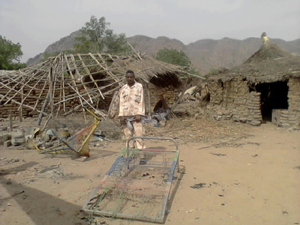SUDAN-SOUTH SUDAN: A whiff of war
Sudan and South Sudan appeared to edge closer to war this week amid an escalating confrontation over the oil-rich borderland region of Heglig.

War damage: the South Kordofan town of Talodi has been the scene of recent fighting
Sudan's parliament approved the mobilization of the armed forces and suspended negotiations with South Sudan after its newly independent neighbour moved its forces into Heglig.
Sudanese President Omar al-Bashir had already issued a decree forming a high-level committee for mobilization on 26 March.
“This brings us back to the sad days of the civil war with South Sudan,” said Usamah Mohamed Ali, a software engineer, referring to 21-years of conflict which ended with the 2005 signing of a peace accord.
“Families used to hide their sons to keep them away from war and fighting, but at least at that time Sudan was economically well-off, so people could somehow swallow the government discourse of mobilizing young people to war to fight the enemy and achieve stability and welfare in Sudan.”
But with a faltering economy and the government’s failure to reach a political solution, Ali believes Sudanese people can no longer buy into this rhetoric.
Sudan's annual inflation rate rose to 22.4 percent in March as food costs climbed, driven by higher meat, bread and milk costs, according to the Central Bureau of Statistics. This morning the US dollar was trading at six Sudanese pounds on the black market, twice the official rate.
There were long queues at petrol stations in Khartoum this week.
"I spent two hours from midnight till 2am [on 11 April] in a gas station next to my house in order to have enough gasoline to get to work… In the end I had to take my shot in another station," Khartoum resident Muhammed Hamadein told IRIN, adding: “We’ve been through the ugly experience of food and fuel shortages during the 80s and 90s… I’m sure Sudanese people have had enough of two decades of lies, corruption and division.”
South Kordofan
On April 12, Sudan’s information ministry flew foreign journalists to Talodi, a town in South Kordofan, a border state where government forces have been fighting rebels since June 2011.
Homes and other buildings in the town were burnt out. Officials travelling with the journalists blamed the damage on an assault by SPLA-N rebels, which Khartoum accuses of being backed by their former comrades-in-arms now in power in South Sudan. The conflict in South Kordofan’s Nuba Mountains has displaced around 20,000 people across the border into South Sudan and severely disruption agricultural production.
“I had just finished my exam when fighting took place. We heard the shelling and we had to take shelter under desks,” said 13-year-old Safeya who was carrying a bucket of water back to her hut. “I’m used to it now, it can happen any time.”
Samah, a woman in her 50s who works in a small kiosk, said people were fearful. “Fighting erupts every now and then. We’re becoming used to the shelling. Women hide or flee a few kilometres when there’s an attack, then come back, while men are always ready with their guns.
“The financial situation is very, very bad here,” she added. “You don’t expect a man carrying a gun to work and make money.”
Source: IRIN
- 490 reads
Human Rights
Ringing FOWPAL’s Peace Bell for the World:Nobel Peace Prize Laureates’ Visions and Actions

Protecting the World’s Cultural Diversity for a Sustainable Future

The Peace Bell Resonates at the 27th Eurasian Economic Summit

Declaration of World Day of the Power of Hope Endorsed by People in 158 Nations

Puppet Show I International Friendship Day 2020

